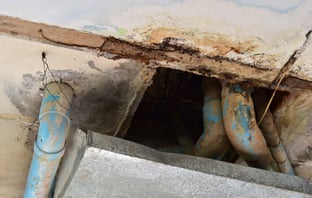 Pollution liability policies are only for contractors involved in environmental or pollution cleanup … or so goes the common perception in the construction industry.
Pollution liability policies are only for contractors involved in environmental or pollution cleanup … or so goes the common perception in the construction industry.
The truth is a trade contractor without a pollution policy actually has a serious coverage gap when it comes to mold, bacteria, asbestos, silica, and lead.
Insurance carriers, always adverse to risk, write General liability policies with exclusions specifically for the aforementioned substances. It would instead be the Contractor’s Pollution Liability policy picking up the tab for bodily injury and property damage claims involving these often overlooked pollution conditions.
Just about every contractor has some exposure to these elements:
- Plumbers have exposures to category 3 water (the water in drain pipes), mold, and bacteria. When the plumber’s work goes wrong, water damage caused by leaking pipes can lead to mold growth. A claim from a bystander alleging his quality of life was impaired due to the bacteria-abundant “category 3 water” would be excluded from a general liability policy.
- HVAC Contractors need worry about mold, bacteria, and legionella. Condensation in HVAC systems generally is the culprit in mold/legionella issues. Should your company have installed an HVAC system with too much humidity resulting in mold, claims arising out of the bodily injury (or even claims from the mere worry of bodily injury) would be excluded from a general liability policy.
- Roofing Contractors have exposure to mold, lead, and asbestos. Working on older buildings increases the chance of lead and asbestos exposure. Even a simple defect in the installation or repair of a roof could cause a large pollution related loss – i.e. a leaky roof resulting in mold growth. Costs associated with locating and removing mold can be extensive as the structure needs to be thoroughly inspected.
- Electricians are not exempt either from pollution liability and have similar exposure to mold, lead, and asbestos. Imagine a contractor running wire above a ceiling and stepping on a sprinkler pipe hidden by insulation. Should water damage result in mold growth, a general liability policy would not be your go-to. Like a roofer, work on older buildings increases the chances of lead and asbestos exposure.
Some Insurance carriers offer limited scope pollution endorsements. These endorsements do not compare in scope of coverage to a properly designed contractors pollution liability policy. After a loss, it’s too late to find out if a limited scope pollution endorsement provides enough coverage.
Should you have any further questions on potential coverage gaps in your current policy, talk to your Commercial Insurance Agent or shoot me an email.

